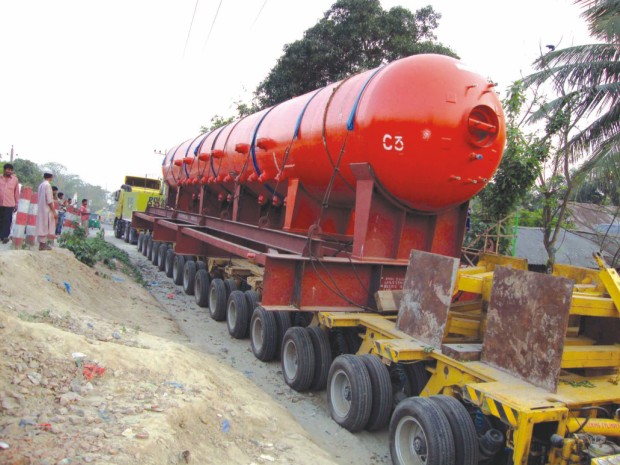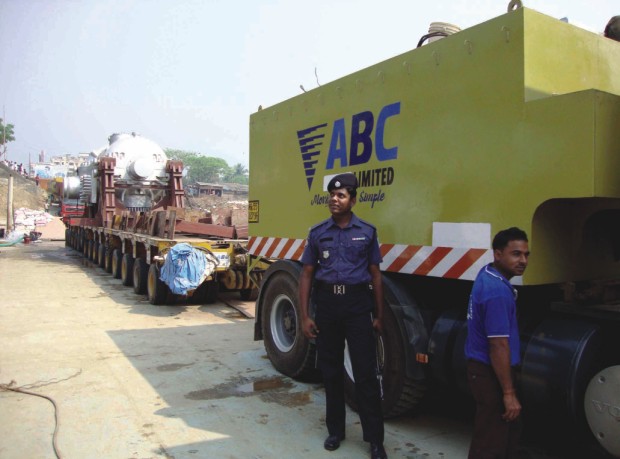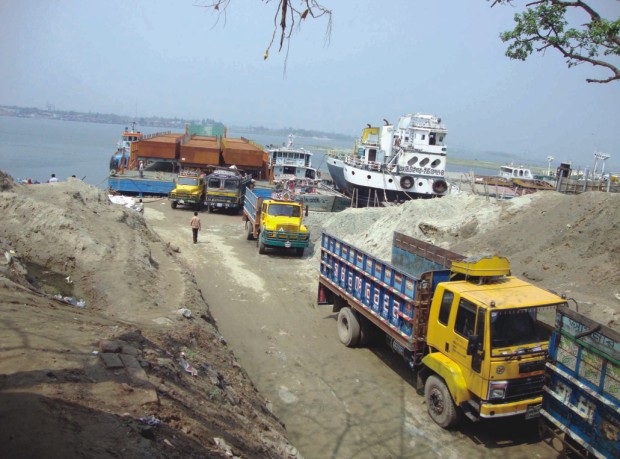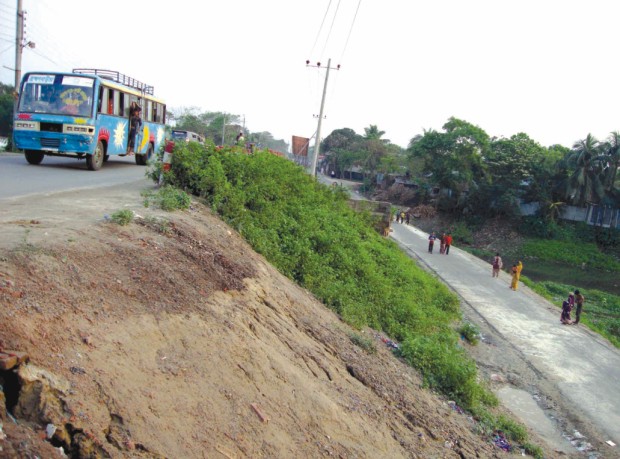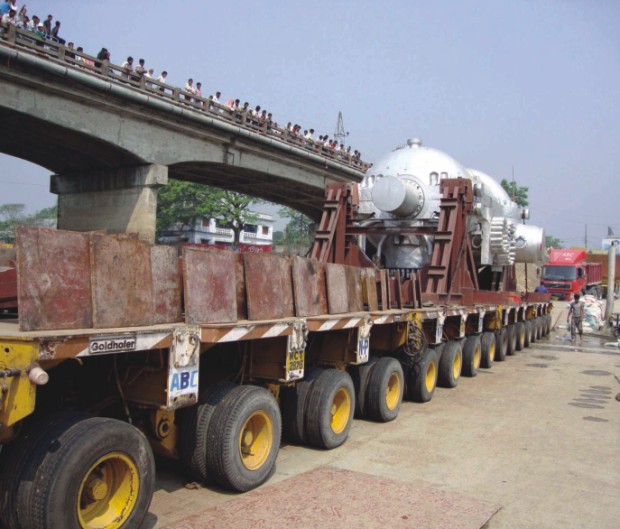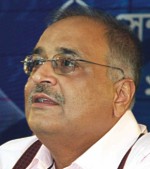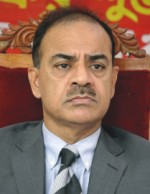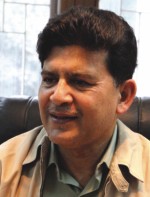| Home - Back Issues - The Team - Contact Us |
 |
| Volume 10 |Issue 19 | May 20, 2011 | |
|
|
Cover Story
The Big Bargain? Although nothing is finalised yet, the government's good intentions towards transit are evident. Roles that both the political parties have played in formulating a policy on the issue are predictably disheartening. Going beyond such unprofessional approaches, it is time the political bosses together with the economists and transit experts went for a unanimous policy that will serve the national interest. Rifat Munim As the mounting tide of speculation on the capital market has ebbed, amendments to the constitution and the surge in crimes, especially those committed by law enforcers have taken centre stage. However, it is only occasionally that discussions on transit, something that will have far reaching consequences on the economy, are put on the table. Even when it surfaces in the newspapers, it is presented in fragments. The issue in its entirety has been glossed over even though transit on a small scale is already underway. Ever since the transit issue was underscored along with other political, financial and geographical concerns in the Joint Communique signed between the premiers of Bangladesh and India in January last year, it has seen heated debates. But instead of forming a productive national debate so as to identify the country's interest and provide a guideline, we have seen the party bosses dividing themselves along several opposing lines with sporadic but provocative comments that merely provided new fodder for the same old blame-game. Amidst such an unsettling political scene the transit talks remain a conundrum for most people because of the ambiguity related to its pros and cons. The debate about transit began with the fundamental question: whether it would serve or go against our national interest. One side exalted in the spirit of liberalism and overemphasised regional connectivity for the greater interest of South Asia; the other side decried it as yet another conspiracy against the country. But when the prime minister's economic affairs adviser Dr Mashiur Rahman, to stoke some fuel to the already bursting flame, said in September 2010, that there would be no transit fee whatsoever, it provoked not only political high-ups belonging to the opposite pole, but attracted the ire from a good section of intellectuals and economists. Later, the finance minister formed a committee under the tariff commission and asked its members to submit a holistic report to the commerce ministry, covering everything related to the issue, including fees and charges. Reports from all the sub-committees have been submitted lately. As the issue involves several ministries including foreign, commerce, finance, communications, and the relevant government bodies including the NBR, decisions about fees, charges and other related issues are soon to be made in an inter-ministerial meeting.
The Commerce Minister Faruk Khan in an exclusive interview with the Star says that although the government is keen on transit, nothing is finalised yet. “We are considering the transit issue with India, Nepal, Bhutan, Myanmar and China because we believe it will serve our national interest. That being said, I must say that everything is in the talks now and implementation of the proposed deals is possibly a far-off thing.” However, several projects of infrastructure development utilising the Indian $1 billion 'tied loan' have already been initiated, which can well be regarded as a starter since most of the projects are to build, rebuild or renovate road and rail links to carry goods between the two countries. Besides, four consignments of giant Indian Hydraulic Excel Trailers loaded with equipment for Palatana Power Station in Tripura hit the Bangladeshi roads in the last week of March this year. According to a memorandum of understanding, a total of 96 consignments for the power station will travel from West Bengal to Tripura using Bangladeshi waterways and road routes by the end of June 2012. Thereafter, the debate has resumed taking on newer dimensions. The underlying nature of the debate, however, remains exactly the same. If you just know what one side is voicing, then the very predictable outcome of a binary opposition will tell you about the stance taken up by the other. Hossain Zillur Rahman, a political economist and a former adviser to the caretaker government, says of the present nature of the debate, “One party says transit is evil while the other party asserts it is an unqualified good. Both of these assumptions are emotional outbursts that originate from premeditated beliefs and are aimed at contending, not at identifying the prospects and problems of the issue. So the present nature is either obstructive or over-indulgent which does not reflect the national interest as such.”
Mohammad Yunus, a senior research fellow at Bangladesh Institute of Development Studies, and also a member of the government committee on transit, also admits the utmost importance of a professional debate regarding transit. He says, “It is highly important that we initiate a professional debate on this. When experts demonstrate their differing views with respective research studies, then the process of getting a flawless guideline becomes much easier. Moreover, since there was no substantial professional debate on this, a number of misconceptions have arisen which are now working as an obstacle to moving forward with this issue.” So what is the most appropriate approach to initiating inter-party or professional talks on transit? According to Zillur Rahman, the approach should be made with an open mind since there is no denying that the geographical location of Bangladesh is in itself one of the greatest resources for the country. “Consider how blessed our geographical location is. Bangladesh is at the centre of three growth poles of the current global economy: India, China, and the South East Asian (ASEAN) countries. So we must make the best use of our unique geographical location. It is also absolutely important that we approach the issue with an open mind whereby our guiding principle will be to ensure our national interest, not to obstruct the prospects of the whole thing,” he says. Bangladesh is endowed with a unique geographical location with two landlocked countries (Nepal and Bhutan) and a nearly landlocked region of north-eastern India at its hinterland. So development of regional connectivity in South Asia and South East Asia largely depends on the transit traffic through Bangladesh. Concurring with Rahman, Yunus also says that any talk on transit should begin with the realisation that the transit-friendly location of Bangladesh can be turned into a financially viable industry by means of trading in transport services. He, however, proposes that another objective should be to clear the air about a number of misconceptions that have arisen over the past few months. “Apart from enlightening all about its potential, a constructive talk should also clarify some misconceptions about the issue.”
The most recent debate is about whether WTO rules should be invoked in matters of fixing the transit fee. According to Article V of the General Agreement on Tariffs and Trade (GATT), all traffic in transit “shall be exempt from customs duties and from all transit duties or other charges imposed in respect of transit.” According to an article published by Dr Rahmatullah, who is also a member of the government committee, Bangladesh will derive the greater part of the projected profit from the amount the transit-seeking countries will save in travel time and transport cost given that a fair share of the savings (which could range between 12% to 76%) will come to the Bangladeshi side. But if the WTO rules are to be invoked, then the transit fee accruing from the savings of the receiving country cannot be charged. Yunus, who along with Dr Rahmatullah has worked extensively on the cost-benefit analysis of transit under a yet-to-be-published ADB report, sides with WTO and voices the urgency of working in line with the WTO provisions, “Charging transit fee based on the savings of the other country goes against WTO provisions. But we can impose charges for the services we are providing,” he says. However, Debapriya Bhattacharya, a distinguished fellow at the Centre for Policy Dialogue (CPD), and a former ambassador of Bangladesh to the WTO, believes that formulating transit fees with reference to WTO rules is not a well thought-out approach. “If we are intent on making the transit deal successful, then the economic viability of it should be given utmost priority. There are unavoidable ambiguities embedded in the WTO provisions, especially in the nature and number of the contracting parties involved in the transit deal. So we should opt for a bilateral agreement the objective of which should be to maximise our profit rather than recovering the basic cost,” he says.
The projected cost of developing the required infrastructure amounts to nearly seven billion US dollars, a colossal amount that Bangladesh has to manage by seeking foreign loans, not grants. Furthermore, only about 10 percent of the full potential will be realised during the first five years when the various projects to facilitate transit movements are supposed to be implemented. Against such a backdrop, Bhattacharya seems to hit the nail in the head when he says our objective should be a lot more than recovering the basic cost. Hossain Zillur Rahman, on the other hand, strongly critiques the present trend of the transit talk in that it always boils down to the financial aspect of the issue. In his view, while the economic dimension is highly important, transit is a multi-dimensional issue requiring a broader focus on other related political as well as geographical issues. “Even when we talk about the financial aspect, we seem to rely too much on projected figures. And how many reports do we have? We seem to be talking about only one ADB-funded report which seems to have been predicated upon some miscalculations about the profit. Such a situation is very unsatisfactory. To overcome this, we need more researches with specific identification of our profits,” he says referring to the WTO rules that were not taken into account previously by the experts working on it. Several points of departure still exist among economists and transit experts. But what positions them on a common ground is the shared belief that transit offers us an unprecedented business opportunity; and what makes them depart from one another is the fundamental aspect of how to deal with it. What we need in the face of such heated debates is an all-encompassing model for transit that would ensure our interest in all respects. In order to do that, both the political parties should come up with their own research and identify the country's interests in the most concrete manner. In the absence of such democratic practices, it is the moral duty of the economists and intellectuals to initiate a constructive debate and provide the policymakers with a complete guideline. The General Agreement on Tariffs and Trade Article V 3. Any contracting party may require that traffic in transit through its territory be entered at the proper custom house, but, except in cases of failure to comply with applicable customs laws and regulations, such traffic coming from or going to the territory of other contracting parties shall not be subject to any unnecessary delays or restrictions and shall be exempt from customs duties and from all transit duties or other charges imposed in respect of transit, except charges for transportation or those commensurate with administrative expenses entailed by transit or with the cost of services rendered. 4. All charges and regulations imposed by contracting parties on traffic in transit to or from the territories of other contracting parties shall be reasonable, having regard to the conditions of the traffic. 5. With respect to all charges, regulations and formalities in connection with transit, each contracting party shall accord to traffic in transit to or from the territory of any other contracting party treatment no less favourable than the treatment accorded to traffic in transit to or from any third country. Debapriya Bhattacharya on WTO rules
Considering the WTO rules in matters of fixing transit fee is arbitrary and does not seem to secure our national interest. As is implied in paragraphs 3-5 of the GATT article V, transit involves a process of transporting goods originating in one country, passing through a second country and terminating in a third country. However, it does not clarify if there must be a third country creating an unavoidable ambiguity. Since it is open to debate, there are scopes for flexible interpretations If we go by the WTO rules, then we will have to extend the facilities equally to other countries. In that case, Bangladesh will not be able to charge higher transportation fees for 'traffic in transit' and cause 'unnecessary delays or restrictions'. This also implies we cannot opt for transshipment deals because it will cause them both unnecessary delays and charges. So, it may prove to be an obstacle to utilising our trucks for transporting their goods. If we have to resort to the WTO rules, then we must be aware of all the rights guaranteed to us. First of all, not all land or water routes are available for free transit since transit is to be provided through the most convenient routes from the perspective of the transit-allowing country. In para 3 two kinds of 'reasonable' charges are indicated: 'transportation charges'; and 'administrative expenses'. The WTO, however, is yet to determine what constitutes the reasonable charge with regard to the services rendered. So, there are ample opportunities for negotiation. Besides, the transit talks started from the joint communiqué, which is a bilateral agreement. So, it should be dealt with as such. And if we refer to the WTO rules while signing bilateral deals, it is arbitrary. In any case, the transit fee should include tolls and road charges, congestion charges, cost of lands and its impact on food production, environmental damages etc. Mohammad Yunus on WTO rules
According to GATT Article V, all foreign goods moving through our country shall be exempt from transit duties. So we cannot charge any fee or a share of what the other party is saving by using our routes. But we will earn revenue from service charges that include transport charges, port and border crossing charges, toll charges for the bridges, and user costs of various forms. If necessary, we can also utilise the transhipment facilities by making them use our vehicles for transporting their goods. This would enhance our income and does not go against the WTO rules. The article creates an ambiguity as to how many countries are involved in the transit deal, whether two or three. But I believe the rule applies to all whether it involves two or three countries. Besides, we are not exporting or importing anything, so we cannot impose any duties on those goods. As for our benefit, the user costs and other charges, which do not go against WTO rules, will definitely ensure our benefit and interest. However, the exact projected figure of our profit is yet to be calculated. Moreover, based on the same rules we propose to give transit to Nepal, Bhutan and other countries. Ushering in a New Era Is there any progress in the transit talks?
The talks are at the primary level. But the government is considering transit with India, Nepal, Bhutan, Myanmar and China. We believe that transit facilities will be highly economically viable for us. Moreover, by way of giving transit, our infrastructure will be developed which will also help increase our internal trade and business. We assigned the tariff commission to do some comprehensive studies on transit. They have submitted a report presenting us with a detailed study of the routes and approximate amount required to build up the infrastructure; and some recommendations about fee and other related issues. But we, in an inter-ministerial meeting, have asked them to review some specific issues. What do you think of the outright criticism from the opposition? While fixing the fees, do you think WTO rules should be referred? Many believe transit should be utilised as a catalyst to expand business and as a leverage to solve other unresolved political issues. As the commerce minister, what is your take on lessening the trade gap between India and Bangladesh? I must welcome the suggestion of turning the opportunity into a catalyst. If we can grab the chance properly, then we can gradually expand our trade with all the neighbouring countries. However, I don't think leverage is the appropriate way to deal with other unresolved issues. Banking on one of our advantage, we should not force others to accept what we want. Instead of leverage, mutual cooperation should be the basis of working out those issues. As for the trade deficit, we are working to lessen the gap and I think we have already made some significant progresses. Our business as well as export to India has increased from 2008 to 2010, and the same upward trend is continuing. Is there any progress in removing the non-tariff barriers imposed by India? So instead of leverage, we are trying to make India understand that we should do business for the mutual benefit of our people. What about the problem of certification? I think trade deficit should be viewed more holistically, not with a narrow mind frame. Above all, we will have to try to export more to and import less from India. For that to happen, we'll have to build our capacity and increase our production. Hossain Zillur Rahman on transit and related issues
Transit is a multi-dimensional issue as far as I can see. Firstly, the issue of transit as income and I think this aspect has already been overemphasised. Secondly, there is the aspect of transit as catalyst whereby we can utilise transit for regional economic expansion, and thus ensure our access to a bigger market. Thirdly, transit as leverage by which I mean by giving this facility we gain leverage to work on other areas such as other long-standing unresolved issues. Among these, four are very important requiring immediate address: The water-sharing issue Maritime boundary Border demarcation that also relates to border killings, a political situation that is worsening day by day. Access of our products to the Indian market. When we talk about transit, we should keep all three dimensions in mind, because they are relevant as well as related to each other. So, multiple countries are involved in transit offering multiple options for each country. Our first task is to define our own interest and set up our priorities on each of these dimensions. In so doing, if it contradicts with the interest of another country, we will resolve that on a give and take basis. However, the scope of the whole issue should never be narrowed down to transit as income. Everything, be it trade or culture, has a political connection or dimension. It is very unwise to alienate transit from other issues. By adopting it as such, we can make significant progress in other areas, for example, we can try to remove the non-tariff barriers especially the certification problems. These non-tariff barriers bar our products from entering Indian market widening the trade deficit even more. I'm not saying that we'll do it on a one-to-one basis, but we should keep this in mind. Without keeping those issues unaddressed, I don't believe we can build up mutual co-operation in cultural and economic affairs.
Copyright
(R) thedailystar.net 2011 |
||||||||
